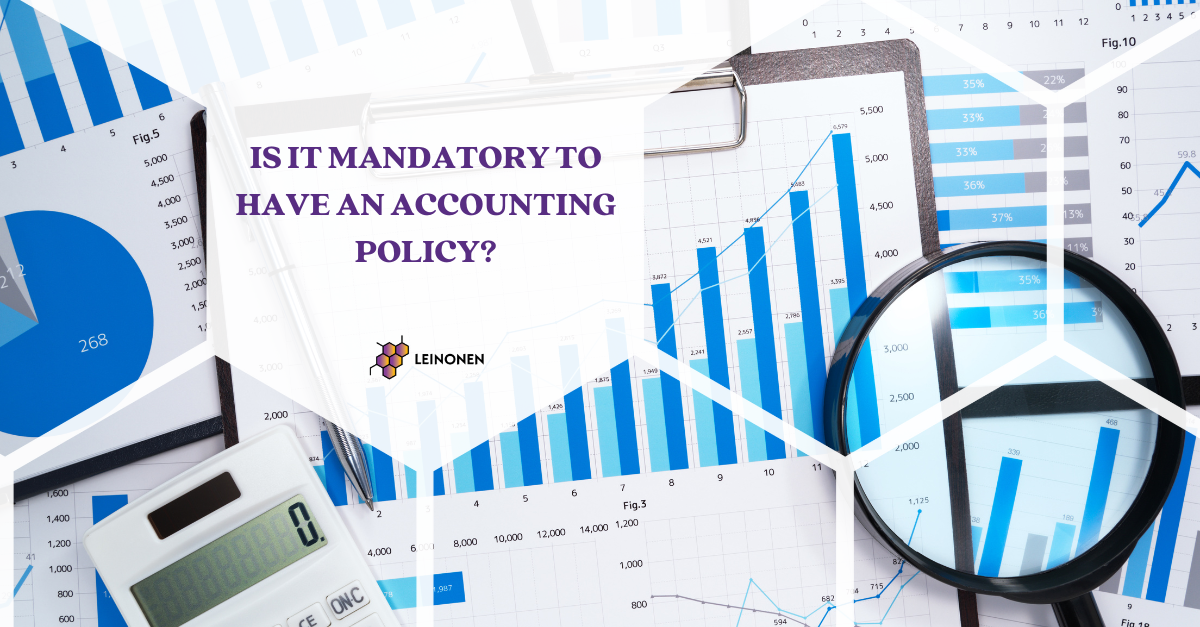One of the frequently asked questions by businesses is whether it is mandatory to have an accounting policy in place. Before diving into the details, it’s essential to review what is outlined in the Accounting Law (hereinafter referred to as the “Law”) regarding bookkeeping.
The Importance of an Accounting Policy
The Law mandates that accounting must be conducted in a way that allows a third party, who is competent in these matters, to obtain a truthful and clear overview of the company’s liabilities, assets, and financial position at a specific date. It should also provide insight into the company’s operational results and cash flow over a particular period. Additionally, the Law requires that the beginning of each economic transaction can be determined and its course traced accurately.
According to the Law, accounting organization documents comprise an aggregate of documents issued by the head of a company. These documents define the procedures for maintaining registers, preparing and handling source documents, performing inventory, preparing annual and other financial statements, and storing accounting documents. Among these, the policy is a crucial document, along with the chart of accounts and other necessary records for the company’s processes.
The Legal Requirement for an Accounting Policy
Section 62 of the Cabinet of Ministers’ Regulation No. 877 “Accounting Regulations,” dated December 21, 2021 (hereinafter referred to as the “Regulation”), specifies that the policy must outline the principles, methods, and rules for accounting, valuation, and disclosure of relevant economic transactions, facts, events, and financial statement items.
Based on these legal provisions, it is clear that an accounting policy is not just important but mandatory. It is a foundational document in accounting organization, dictating how the company’s balance sheet and profit and loss items are recognized in the saved records. Without such a document, a competent third party would be unable to obtain a truthful and clear overview of the company’s financial position, which is a fundamental requirement for proper accounting.
Ensuring Compliance with Legal Requirements
To avoid potential issues, it is strongly recommended that your policy is prepared in accordance with legal requirements. The guidelines for preparing accounting organization documents are detailed in Chapter 8 of the Regulation.
It is essential that the policy contains up-to-date information on the accounting and valuation principles and methods currently applied. Additionally, the policy should reference the relevant laws and regulations in force.
Another crucial aspect to note is the requirement in Section 61 of the Regulation that accounting organization documents must be prepared in Latvian. This is especially important for company groups with a group policy. Given the Regulation’s requirements, it is necessary to ensure that the policy is translated into Latvian and that its contents comply with the legislation of the Republic of Latvia.
Consistency in Annual Statements
The Law on Annual Statements and Consolidated Annual Statements also highlights that the policy used in the preparation of the annual statement must be consistent with the previous financial year. This consistency is vital for ensuring that the data presented in the annual statement are comparable with the prior year. If there is a change in policy, it should be explained in the annex to the annual statement. If necessary, the previous year’s results should be adjusted or reclassified.
Making Changes to the Accounting Policy
Chapter 3.2 of the Cabinet of Ministers’ Regulation No. 775 “Regulation on Application of the Law on Annual Statements and Consolidated Annual Statements,” dated December 22, 2015, outlines the requirements for making changes to the accounting policy. A company may only change its accounting policy under the following circumstances:
- The regulatory framework has changed.
- The application of the previous accounting policy no longer meets the legal requirement of providing a truthful and clear overview due to changes in circumstances.
- The change in accounting policy provides more reliable and relevant information about the impact of economic transactions, facts, events, or circumstances on the company’s financial position, profit or loss statement, and cash flow.
Given these considerations, it is crucial to approach the development of an accounting policy with diligence. It must not only comply with legal requirements but also ensure that a competent third party can gain a truthful and clear understanding of the company’s business activities. This can only be achieved by selecting reliable and appropriate accounting and valuation principles and methods. Furthermore, the company’s management should be prepared to justify any changes made to the policy.
For micro or small companies, the “Handbook on Accounting Organization Documents,” issued by the Association of Accountants of the Republic of Latvia, can serve as a useful guideline for preparing an policy. However, it is important to remember that the policy must be tailored to the specific activities of each company; there is no universal template.
If you are unsure about your ability to prepare an policy on your own, it is advisable to seek professional assistance. This can help you avoid unnecessary difficulties and allow the company’s management to focus more on business development.





